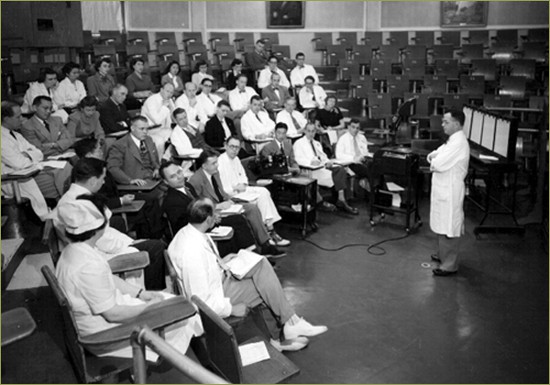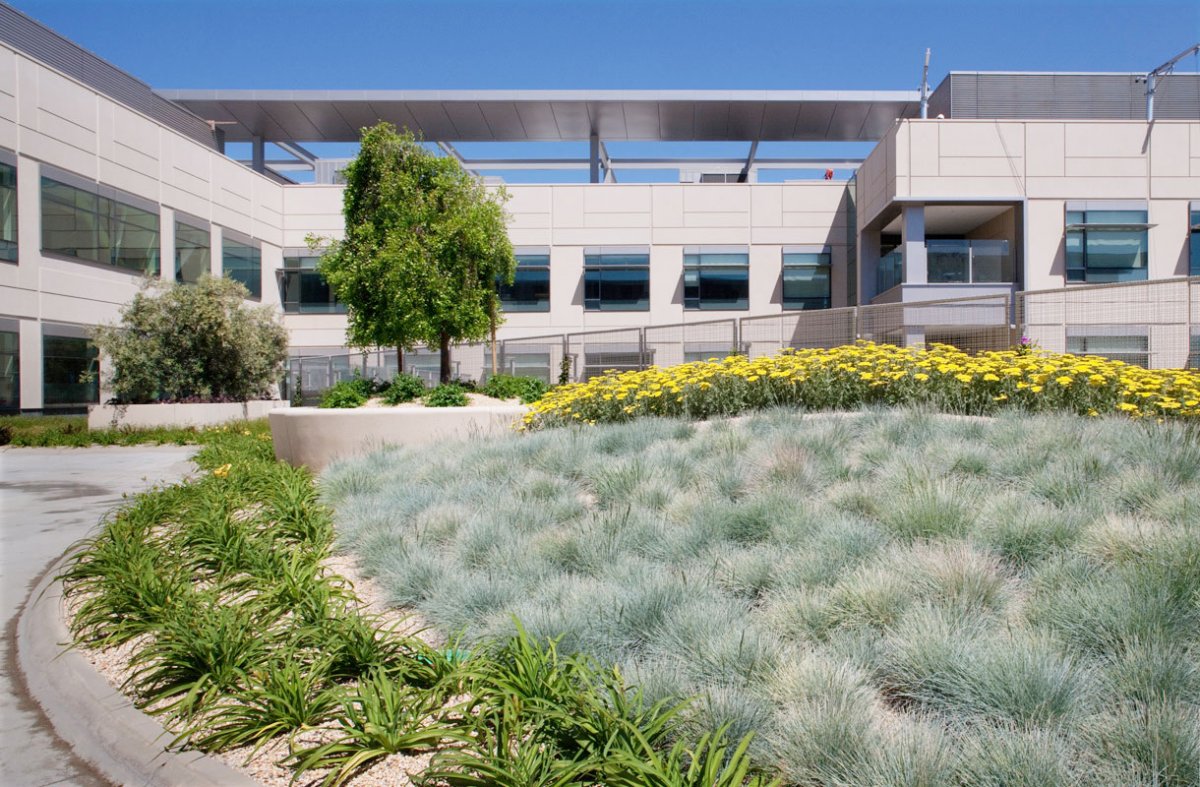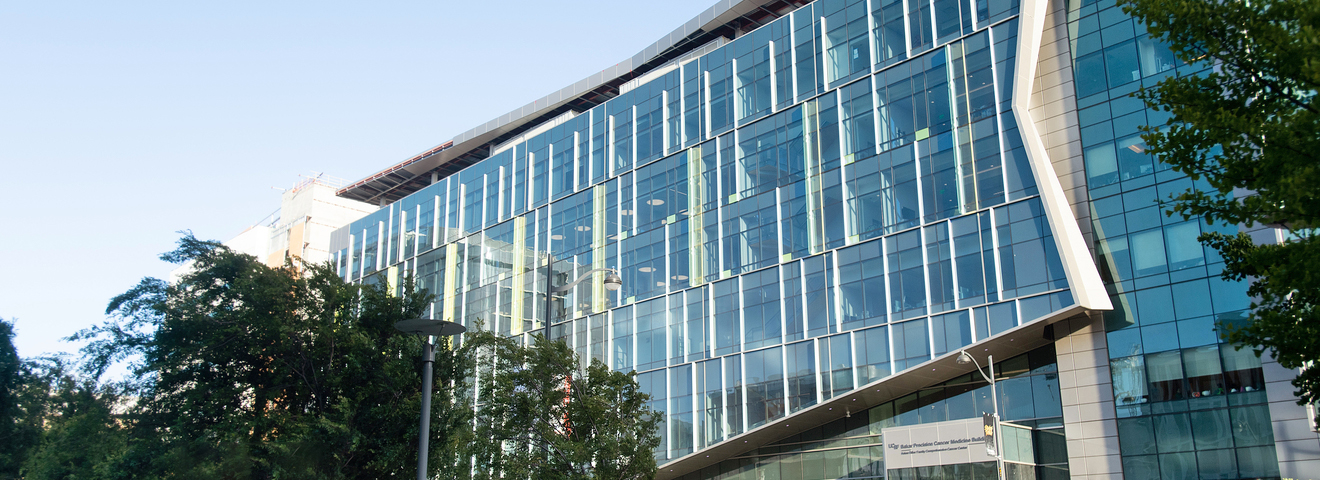A Commitment to Cancer Research and Care
UCSF has a long and continuing history of excellence in cancer research and care. The first attempt at coordinating cancer at UCSF was a collaboration between the UC School of Medicine, the city and county of San Francisco and the National Cancer Institute in 1947 with the Laboratory of Experimental Oncology. During its five years of operation (1947-1953), LEO investigators produced 124 scientific papers, based upon 605 "experimental treatments" conducted on 467 cancer patients admitted to the lab's experimental ward.

The Consultative Tumor board is pictured discussing UC cancer cases at Parnassus, ca. 1952. Chairman of the Board is Dr. David A. Wood (standing), who later became head of the cancer Research Institute at UCSF.
Courtesy UCSF Library
Following on the LEO's heels, the tradition of cancer-related research at UCSF owes much to the vision of David A. Wood, MD, who in 1948 was appointed as the first director of the UCSF Cancer Research Institute. Wood felt that the key to curing cancer is "the multidisciplinary approach, both clinical and basic scientists working together." That philosophy is still the core of UCSF's efforts.
The period 1959-1989 witnessed a revolution in the health sciences and biomedical industries, particularly the creation of the biotechnology industry that has made the San Francisco Bay Area and UCSF so notable as an innovator in biomedical research. Beginning in the mid 1960s, reforms in graduate teaching and interschool collaboration had resulted in pioneering programs which catapulted UCSF to the top ranks of US institutions for education and research in the health sciences.
Through the 1970s, associated departments such as Radiation Oncology and Hematology/Oncology were developing across UCSF and would become instrumental in UCSFʻs application for NCI designation. By the 1980s, the hospitals cared for an average of 20,000 inpatients annually, while the clinics at the Ambulatory Care Center received an average of 190,000 patient visits each year
Seminal contributions in cancer research at UCSF include, notably, the work of Drs. J. Michael Bishop and Harold Varmus, who were awarded the 1989 Nobel Prize in Medicine for their discovery of oncogenes, and Dr. Elizabeth Blackburn, who was awarded the Nobel Prize in 2009 while at UCSF for her groundbreaking work on the molecular nature of telomeres.
The Cancer Center achieved status in December 1999 as an NCI-designated "comprehensive cancer center," the highest of three designations. NCI-designated cancer centers are characterized by scientific excellence and their ability to integrate a diversity of research approaches to focus on the problem of cancer. In addition to undertaking novel laboratory-based and clinical research, as well as maintaining excellent clinical care programs, comprehensive cancer centers must integrate cancer prevention, control, and population sciences. Through these combined activities, comprehensive cancer centers play an important role in their communities and regions and serve to influence standards of cancer prevention. In November 2007, the Center was renamed the UCSF Helen Diller Family Comprehensive Cancer Center in tribute to Bay Area resident Helen Diller and her family's trust in UCSF's ability to rapidly translate cancer discoveries into compassionate care.
Mission Bay Expansion
The Cancer Center grew substantially with an anonymous pledge of $150 million in 2007, which expanded the Center’s infrastructure for experimental therapies and augmented clinical research activities including the launch of an early-phase trials unit and improved efforts in medical informatics.
 At Mission Bay, a multi-decade growth plan doubled UCSF's fundamental research enterprise. The Center expanded its profile within the University in 2009 with the opening of the Helen Diller Family Cancer Research building at the UCSF/Mission Bay campus. In 2015, UCSF opened a 289-bed medical center complex which includes the Bakar Cancer Hospital and the UCSF Benioff Children's Hospital, which accommodates the Center's Pediatric Malignancies Program. This state-of-the-art facility features lasers, robotics, telemedicine systems and other advanced technology of today, with room to accommodate the innovations of the future. The opening of the new cancer hospital represented a 40% growth in cancer surgery, as well as the co-localization of research and clinical care.
At Mission Bay, a multi-decade growth plan doubled UCSF's fundamental research enterprise. The Center expanded its profile within the University in 2009 with the opening of the Helen Diller Family Cancer Research building at the UCSF/Mission Bay campus. In 2015, UCSF opened a 289-bed medical center complex which includes the Bakar Cancer Hospital and the UCSF Benioff Children's Hospital, which accommodates the Center's Pediatric Malignancies Program. This state-of-the-art facility features lasers, robotics, telemedicine systems and other advanced technology of today, with room to accommodate the innovations of the future. The opening of the new cancer hospital represented a 40% growth in cancer surgery, as well as the co-localization of research and clinical care.
The Era of Precision Medicine

UCSF Baker Precision Cancer Medicine Building at Mission Bay opened in 2019. Credit: Noah Berger.
In 2019, UC San Francisco opened the Bakar Precision Cancer Medicine Building (PCMB) devoted to providing adult patients with highly advanced treatments, including immunotherapy, genetic counseling, molecular profiling of tumors, fully integrated clinical trials, and advanced imaging. The PCMB serves as the heart of adult outpatient cancer care at UCSF Medical Center at Mission Bay and places patients and families at the center of a university commitment to deliver a new generation of precision medicine.
Scientific Goals and Emphases
The overarching goal of the Cancer Center is to shepherd new approaches to cancer prevention, detection, and treatment into clinical and population settings, where they can be tested and evaluated. Multidisciplinary programs -- which include lab scientists, clinical investigators, providers of patient care, epidemiologists, and sociobehavioral scientists -- facilitate this process by focusing research on relevant issues to patients and persons at risk of cancer. Collaboration across disciplines ensures that insights gained in the lab can move quickly and effectively to cancer patients’ bedsides and to cancer prevention and control programs.
Many of the Cancer Center’s research programs are organized around organ or disease sites, but because cancers also have common causes and underlying similarities, other programs address overarching themes such as defects in cell cycle control, involvement of immunologic mechanisms, and global changes in gene copy number and chromosome arrangement. Exemplifying the breadth and depth of UCSF’s research strengths is its SPORE grant (Specialized Programs Of Research Excellence), sponsored by the National Cancer Institute. SPOREs are prestigious initiatives that engage lab-based and population scientists, clinical investigators, and advocates in focused areas of research.
UCSF is home to three of the five SPOREs awarded to institutions in California: a Brain Tumor SPORE has been led by Mitchel S. Berger, MD since 2002, a DHART (Developmental and HyperActive Ras Tumor) SPORE co-led by Kevin Shannon, MD and D. Wade Clapp, MD (Indiana University School of Medicine),was granted in 2015. A UCSF-based Head and Neck Cancer SPORE research, conducted in collaboration with UPCI SPORE colleagues, was granted in 2014 and led by then associate vice chancellor of clinical and translational research Jennifer R. Grandis, MD.
As an example of the Center’s large and expanding program of epidemiologic and population-based research, a Bay Area Breast Cancer and the Environment Research Center studies the impact of prenatal-to-adult environmental exposures that may predispose women to breast cancer. The Center’s research programs are supported by a variety of shared resources, or cores, which represent state-of-the-art support services and technology for clinicians, laboratory scientists, epidemiologists, and sociobehavioral scientists. The Cancer Center holds a special relationship with Lawrence Berkeley National Laboratory, which leverages unique strengths at both institutions and encompasses mutual interests in cancer research and technological discovery.
Population Health and Community Engagement
In addition to its research initiatives, the UCSF Helen Diller Family Comprehensive Cancer Center sponsors a wide variety of programs and services in the areas of community outreach, education, and information dissemination. Many community outreach activities are focused on cancer prevention and control, such as the San Francisco Cancer Initiative, launched in 2017 with the goal of targeting the five most common cancers in San Francisco.
Our Office of Community Engagement provides year round non-transactional support for community partners, disseminates screening and treatment information, and advocates for policies that support our diverse communities accessing care at HDFCCC. Other outreach activities include free support groups, workshops, and wellness programs; faculty collaborations with local public schools; sponsorship of community-based conferences and programs; and provision of community-based research studies that have outreach components.
Cancer and Genetics
As researchers continue to unravel the genetic basis of cancer formation and progression, an increasing number of inherited characteristics have been identified that confer risk for cancer in individuals. At UCSF, risk assessment is provided for several cancer types, including breast, colon, prostate, and ovarian, and counseling is provided for individuals at risk. The Cancer Genetics and Prevention Program, the largest genetic testing center for cancer in Northern California, is a comprehensive genetic counseling service for families with a history of cancer. Our Hereditary Cancer Clinic offers patients and families with genetic mutations linked to hereditary cancers personalized care and planning for their long-term health. The Center for BRCA Research provides a central resource for families with BRCA and other mutations to receive personalized care and planning for their long-term health and well-being.
Education and Training
Our Office of Education and Training leverages the rich learning environment, resources and opportunities available within the greater UCSF campus community, to complement HDFCCC activities and develop new education programs were needed. Educational activities include programs geared to laboratory and population scientists, clinicians, and allied health professionals. Scientific symposia attract nationally known cancer researchers; regular scientific seminars bring esteemed researchers to UCSF for discussion and collaboration; and Continuing Medical Education conferences have an important impact on the health care community in California and nationally.
Clinical Research: Hope for the Future
UCSF’s investigators aim to test the scientific insights gained in the lab against the real-world standards of patient care and disease prognosis. Advances in immunotherapy have spawned clinical trials of new pharmaceutical agents and gene therapies, as well as improvements on existing drug regimens and radiotherapeutic treatments, pose hypotheses and answer questions for both physicians and patients.
UCSF researchers participate in national cooperative groups, through which widely available clinical trials can provide conclusive data on promising therapies. They also design their own protocols for studies that follow closely on lab research and provide “proof of concept” for cutting-edge approaches. Just as the Center’s philosophy is based on collaboration among basic scientists and clinical health care providers, ultimate progress in the struggle against cancer will come from collaboration among scientists and cancer patients themselves.
